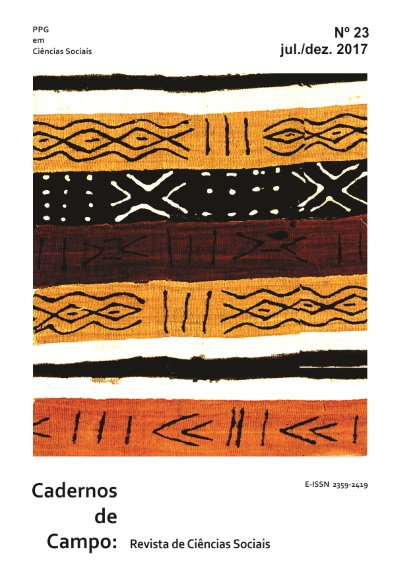Me, as a young person… that’s not the life I want. The motoqueiros in São Tomé and Príncipe: a risky strategy of survival
Keywords:
Informal economy, Informal transport, Motorbike-taxis, São Tomé and Príncipe,Abstract
The story of santomean motoqueiros is not very old, but the rapid growth of the number of people involved in this informal sector of transport raises several questions about this phenomenon and the social and economic consequences related to it. This article presents an analysis of the ambiguity of this profession, the description of the main problems that hinder the lives of those who have decided to dedicate themselves to provide this service, a brief overview of the processes of organization among the workers in the sector and the presentation of some facts from the life histories of the representatives of this profession, so precarious and so sought after.
Downloads
References
ABUHAMOUD, Massoud Ali Ahmed, RAHMAT, Riza Atiq O.K., ISMAIL, Amiruddi, Transportation and its Concerns in Africa: A Review. The Social Sciences, 6(1), pp. 51-63, 2011.
ALEGRE, Francisco Costa, A Cidade de S. Tomé. A Cidade de Todas as Esperanças, São Tomé e Príncipe: UNEAS, 2009.
AROSANYIN, Godwin Tunde, OLOWOSULU, Adekunle Taiwo, OYEYEMI, Gafar Matanmi, Employment Generation and Earnings in the Informal Transport Sector in Nigeria. International Business and Management, 2(2), pp. 139-148, 2011.
BANCO AFRICANO DE DESENVOLVIMENTO, Ambiente do Investimento Privado em São Tomé e Príncipe, Grupo do Banco Africano de Desenvolvimento - Departamento Regional Centro, 2011.
BANGASSER, Paul E., The ILO and the informal sector: an institutional history, Geneve: International Labour Organization, 2000.
BOKO, Gbètoho M. Joachim. Air Pollution And Respiratory Diseases In African Big Cities: The Case Of Cotonou In Benin. In: BUNCH, Martin J. Bunch, SURESH, V. Madha, KUMARAN, T. Vasantha (Eds.). Proceedings of the Third International Conference on Environment and Health, Chennai, India, 15-17 December, 2003. Chennai: Department of Geography, University of Madras and Faculty of Environmental Studies, York University, pp. 32-43, 2003.
GOVERNO CONSTITUCIONAL. Programa do XV Governo Constitucional. São Tomé e Príncipe, 2012.
HART, Keith. Small-scale Entrepreneurs in Ghana and Developement Planning. In: Journal of Modern African Studies, 6, pp. 104-120, 1970.
HART, Keith. Informal Income Opportunities and Urban Employment in Ghana. In: Journal of Modern African Studies, 11(01), pp. 61-89, 1973.
INE. Repatriação de população residente segundo idade simples por sexo, resultados do Censo 2012 fornecidos pelo INE, 2013a.
INE. IV Recenseamento Geral da População e Habitação de 2012 (RGHP-2012), apresentação para o Seminário de divulgação dos dados, São Tomé, 25 de Setembro de 2012. 2013b.
INE. Perfil da Pobreza em São Tomé e Príncipe, São Tomé: PNUD/INE, 2010.
KRIJN, Peters. From weapons to wheels: young Sierra Leonean ex-combatants become motorbike taxi-riders. In: Journal of Peace Conflict & Development, 10, Março, 2007.
KUMAR, Ajay. Understanding the emerging role of motorcycles in African cities. A political economy perspective, SSATP Discussion Paper No. 13, The International Bank for Reconstruction and Development/The World Bank, 2011.
LOPES, Carlos M., Candongueiros e Kupapatas. Acumulação, Risco e Sobrevivência na Economia Informal em Angola, Cascais: Principia, 2011.
LOPES, Carlos M. Hug me, hold me tight! The evolution of passenger transport in Luanda and Huambo (Angola), 1975-2000. In: GEWALD, Jan-Bart, LUNING, Sabine, WALRAVEN, Klaas, The Speed of Change. Motor Vehicle and People in Africa, 1890-2000, Leiden – Boston: Brill, 2009.
MAWUDEKU, Koffi. The youth and the employment situation in Togo, Paper No. 6015, Munich: MPRA, Munich Personal RePEc Archive. Disponível em: http://mpra.ub.uni-muenchen.de/6015/1/MPRA_paper_6015.pdf, 2007.
MENZEL, Anne. So we don’t do something bad! The double-edged qualities of motorcycle-taxi driving in post-war Sierra Leone. In: 53rd annual meeting of the African Studies Association, November 18-21, San Francisco, 2010.
MUTISO, W., BEHRENS, Roger. Boda boda bicycle taxis and theri role in urban transport system: Case studies of Kisumu and Nakuru, Kenya. In Proceedings of the 30th Southern African Transport Conference (SATC 2011), 11-14July2011, Pretoria, South Africa, pp.430-444, 2011.
NCUBE, Mthuli. Recognizing Africa’s Informal Sector. In: http://www.afdb.org/en/blogs/afdb-championing-inclusive-growth-across-africa/post/recognizing-africas-informal-sector-11645/, 2013.
NJIE, Lawrence Nkede, The socio-cultural impact of the introduction of motorbike taxis in the rural community of Tombel, South West region. Dissertação de mestrado. Cameroon: The University of Yaoundé 1, 2012.
OGUNRINOLA, Oluranti I., Informal Self-Employment and Poverty Alleviation: Empirical Evidence from Motorcycle Taxi Riders in Nigeria. In: International Journal of Economics and Finance, 3(2), pp. 176-185, 2011.
OIT. Employment, incomes and equality. A strategy for increasing productive employment in Kenya. Geneve: International Labour Office, 1972.
OIT. Report of Director General Decent Work. 87th International Labour Conference, Geneva, 1999a.
OIT. Conclusions and recommendations. International Symposium on Trade Unions and the Informal Sector, Geneva, 18-22 October, 1999b.
OIT. Decent work and the informal economy. Report VI, 90th International Labour Conference. Geneva: International Labour Office, 2002a.
OIT. Segurança Social: um novo consenso. Lisboa: Departamento de Cooperação do Ministério da Segurança Social e do Trabalho de Portugal, 2002b.
OIT. A OIT e a Economia Informal. Lisboa: Organização Internacional de Trabalho, 2005.
OIT. For debate and guidance. The informal economy. Relatório de Governing Body Committee on Economic and Social Policy, GB.298/ESP/4. Geneva: International Labour Ofice, 2007a.
OIT. The informal economy: enabling transition to formalization. Tripartite Interregional Symposium on the Informal Economy. Geneva: International Labour Office, 2007b.
OIT. The informal economy in Africa. Promoting transition to formality: Challenges and strategies. Geneva: International Labour Office, Employment Sector and Social Protection Sector, 2009.
OIT. Decent Work Indicators in Africa. A first assessment based on national sources. Geneva: International Labour Organization, 2012.
OIT. The informal economy and decent work: a policy resource guide, supporting transitions to formality. Geneva: International Labour Office, Employment Policy Department, 2013.
OLUBOMEHIN, Oladipo O. The Development and Impact of Motorcycles as Means of Commercial Transportation in Nigeria. In: Research on Humanities and Social Sciences, 2(6), pp. 231-239, 2012.
OLVERA, Lourdes Diaz, PLAT, Didier, POCHET, Pascal, MAIDADI, Sahabana. Motorbike taxis in the "transport crisis" of West and Central African cities. In: EchoGéo (on-line), 20 (2012), Abril – Junho, disponível em: http://echogeo.revues.org/13080, 2012.
RODRIGUES, Cristina. “Os filhos não ligam. Os filhos não visitam.” O abandono de idosos em São Tomé e Príncipe, Lisboa: s.n, 2004.
SANTO, Armindo Ceita Espírito. Economia de S. Tomé e Príncipe: entre o regime do partido único e o multipartidarismo. Lisboa: Edições Colibri, 2008.
SCHLYTER, Charlotta. International Labour Standards and the Informal Sector: Developments and Dilemmas, working paper on Informal Economy, 3. Geneve: Employment Sector, International Labour Office, 2002.









